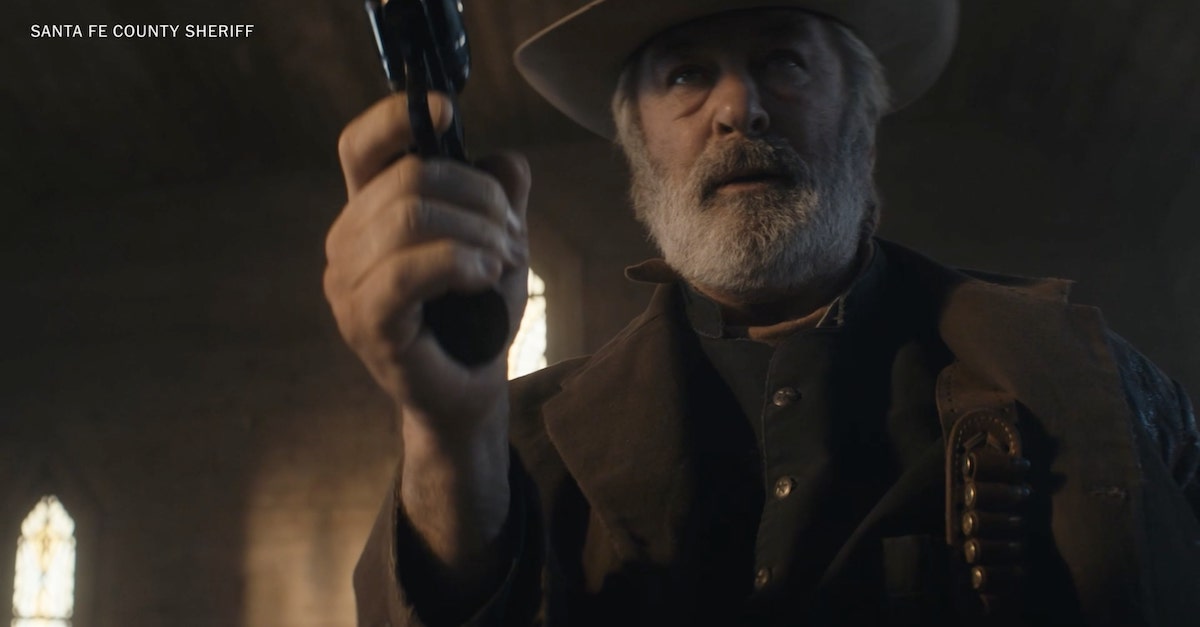
Alec Baldwin holds a gun on the set of “Rust,” in this still frame of a video released by the Santa Fe Sheriff’s office.
Listen to the full episode on Apple, Spotify or wherever else you get your podcasts, and subscribe.
When prosecutors formerly charged actor Alec Baldwin with involuntary manslaughter in the deadly “Rust” shooting, they released reams of paperwork detailing the evidence supporting those charges.
They also revealed the charging documents, which show that the firearm enhancement statute that hangs the heaviest sentence over the celebrity’s head probably stands on shaky ground.
“The five-year mandatory for use of a firearm in involuntary manslaughter did not become New Mexico law until 2022, which is important because this happened in 2021,” former federal prosecutor Mitchell Epner noted on the latest episode of Law&Crime’s podcast “Objections: with Adam Klasfeld.”
Epner, a veteran ex-prosecutor who led intake on sex trafficking cases in New Jersey, is now a partner at the firm Rottenberg Lipman Rich PC, specializing in media law.
“The Exact Opposite of What Was Going on Here”
The U.S. Constitution’s ex post facto clause forbids retroactively punishing people for crimes that did not exist at the time of the offense, Epner noted.
Though New Mexico’s firearm enhancement predates the fatal shooting of cinematographer Halyna Hutchins on the set of “Rust” in October 2021, the version of it charged against Baldwin was enacted the year after the incident.
For Baldwin, the change may be a critical one because the earlier iteration, in effect between July 1, 2020, and May 17, 2022, punished “brandishing” a weapon — defined in the statute as “displaying or making a firearm known to another person while the firearm is present on the person of the offending party with intent to intimidate or injure a person.”
“That’s the exact opposite of what was going on here,” Epner said in the interview. “Everybody thought that this was acting, nobody thought that Alec Baldwin was actually trying to make somebody afraid for their life.”
The broader version of the enhancement has only been in effect since May 18, 2022, and applies to the “Use, brandishing or discharge of firearm.”
Baldwin’s attorney Luke Nikas declined to comment. The Santa Fe District Attorney’s office didn’t immediately respond to a request for comment.
“So I don’t think that that penalty is likely to be imposed,” said Epner, referring to the 5-year enhancement. “The 18-month default thing is very real, though, and 18 months in jail is a substantial penalty for any human being.”
And judging from the evidence described in court documents, Epner added, Baldwin faces significant danger of conviction on those counts.
For Epner, the reason for that has everything to do with Baldwin’s exclusive interview with ABC News in December 2021, where he emotionally — and emphatically — denied having pulled the trigger.
“I would never point a gun at anyone and pull a trigger at them,” Baldwin told George Stephanopoulos. “Never, never. That was the training that I had. You don’t point a gun at me and pull the trigger. On day one of my instruction in this business, people said to me, ‘Never take a gun and go click, click, click, click, click.’ Because even though it’s incremental, you damage the firing pin on the gun if you do that. Don’t do that.”
“A One-Issue Case”
Baldwin’s remarks left little room for interpretation, and as Epner views it, state and federal authorities appear to have demolished that claim.
“So they literally handed this gun to the FBI, and they said, ‘Can you make this gun fire without pulling the trigger?'” Epner noted.
Though the report has not yet been made public, the prosecution’s description of it appears unequivocal.
“This analysis clearly showed that the weapon could not ‘accidentally fire’; for the weapon to fire, the trigger had to have been depressed/pressed,” the prosecution’s summary of the report said.
Going beyond a simple denial, Baldwin’s interview appeared to concede his knowledge that pulling the trigger would be dangerous and against his training. His statements, and the way he delivered them, appear to Epner to have made his case not only difficult to defend — but chargeable in the first place.
“What Alec Baldwin has basically done through his statements is he’s taken away every single defense, except for ‘I didn’t pull the trigger,’ and ‘I didn’t pull the trigger’ has been as thoroughly debunked by the FBI as anything I’ve ever seen,” Epner said. “Now, it’s always possible that the jury, or at least one juror, will not believe the government has proved beyond a reasonable doubt that he pulled the trigger. But he’s really made this into a one-issue case, where I don’t think it would have been a chargeable case without him saying anything.”
Lawyers often advise clients under criminal investigation not to make public statements, and Epner says that Baldwin illustrates the rule.
“Alec Baldwin has made his living speaking,” Epner said. “He’s not only been an actor: He’s been a podcast host. He’s been a guest on numerous talk shows. He believes himself to have made a fortune because he’s good at talking. He’s also been, you know, high profile in Hollywood for 40-some-odd-years. He believes himself to be very good at talking. And what I try to explain to my clients is that no matter how good you are at talking, no matter how much money you’ve made at talking, the only reasonable thing to do when you are under criminal investigation is shut up.”
Epner also shares his insights on Baldwin’s co-defendants Hannah Gutierrez Reed and David Halls in the podcast below.